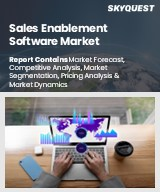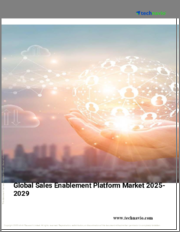
|
시장보고서
상품코드
1915861
세일즈 활성화 소프트웨어 시장 규모, 점유율, 성장 분석 : 컴포넌트별, 도입 형태별, 조직 규모별, 최종 사용별, 지역별 - 업계 예측(2026-2033년)Sales Enablement Software Market Size, Share, and Growth Analysis, By Component (Platform, Service), By Deployment (On-premise, Cloud), By Organization Size, By End Use, By Region - Industry Forecast 2026-2033 |
||||||
세계의 세일즈 활성화·소프트웨어 시장 규모는 2024년에 62억 1,000만 달러로 평가되며, 2025년 72억 8,000만 달러에서 2033년까지 259억 2,000만 달러로 성장할 전망입니다. 예측 기간(2026-2033년)의 CAGR은 17.2%로 예측됩니다.
영업 지원 소프트웨어 시장은 기업이 구매자 참여 강화, 판매 주기 단축, AI 기반 툴을 통한 팀 강화 등을 우선순위에 두면서 괄목할 만한 성장세를 보이고 있습니다. CRM 시스템, AI 기반 코칭, 컨텐츠 인텔리전스 등의 혁신은 디지털 영업 환경에서 영업 지원 소프트웨어의 역할을 확고히 하고 있습니다. 원격 근무 및 하이브리드 근무 모델 증가는 판매자의 생산성 향상과 고객 개인화를 촉진하는 확장성과 유연성을 갖춘 솔루션의 필요성을 더욱 강조하며 시장 확장을 주도하고 있습니다. 그러나 중소기업은 기존 기술과의 통합 문제, 가파른 학습 곡선, 컨텐츠 거버넌스 문제 등 다양한 문제에 직면해 있으며, 데이터 프라이버시 규제에 대한 컴플라이언스는 이러한 문제를 더욱 복잡하게 만들고 있습니다. 이러한 장벽에도 불구하고 판매 효과 향상과 마케팅 전략과의 ROI 정합성에 대한 수요 증가에 힘입어 시장에는 큰 기회가 존재합니다.
세계 세일즈 활성화 소프트웨어 시장 성장 촉진요인
세계 세일즈 활성화 소프트웨어 시장의 성장을 이끄는 주요 요인은 다양한 산업 분야의 원격 및 하이브리드 팀을 지원하는 확장 가능한 영업 프로세스에 대한 수요 증가입니다. 조직은 AI 기반 코칭, 컨텐츠 인텔리전스, 파이프라인 분석을 통합한 플랫폼으로의 전환을 가속화하고 있습니다. 이를 통해 영업 담당자의 즉각적인 지원, 교육 기간 단축, 계약률 향상, 그리고 궁극적으로 매출 증가를 촉진할 수 있습니다. 기업이 측정 가능한 성과를 우선시하고 구매자 참여도를 높이기 위해 노력하는 가운데, 특히 첨단 디지털 판매 역량을 추구하는 기업에서 이러한 플랫폼의 도입과 활용이 크게 증가할 것으로 예측됩니다. 이러한 추세는 효과적인 세일즈 활성화 솔루션의 중요성을 강조하고 있습니다.
세계 세일즈 활성화 소프트웨어 시장을 억제하는 요인들
세일즈 활성화 소프트웨어 시장의 침투를 가로막는 가장 큰 문제는 기존 레거시 CRM 시스템과의 통합에 따른 복잡성과 영업 기술의 파편화된 특성입니다. 많은 중견기업은 단편화된 기술 생태계에서 사업을 운영하고 있으며, 이는 효과적인 지원 워크플로우의 실행을 복잡하게 만들고 있습니다. 이러한 혼란은 다양한 플랫폼 기능의 활용 부족으로 이어져 투자 회수 지연의 원인이 되고 있습니다. 그 결과, 특히 새로운 기술 발전보다 안정성과 익숙한 환경을 우선시하는 전통적 IT 환경에서는 이러한 솔루션 도입에 소극적인 경향이 있습니다.
세계 세일즈 활성화 소프트웨어 시장 동향
세계 세일즈 활성화 소프트웨어 시장에서는 특히 코칭과 트레이닝 분야에서 AI 기술의 통합을 중심으로 큰 변화가 일어나고 있습니다. 생성형 AI 툴은 개인화된 실시간 피드백 및 기술 평가를 제공함으로써 영업팀이 영업 프로세스의 중요한 단계에서 적응할 수 있는 능력을 강화하는 데 중요한 역할을 하기 시작했습니다. 각 벤더들은 지식 정착률 향상과 온보딩 기간의 대폭적인 단축을 위해 마이크로러닝 형식을 우선적으로 채택하여 하이브리드형 영업 환경에서의 효율성을 높이고 있습니다. 이러한 혁신적인 접근 방식은 더 나은 영업 전략 수립에 기여할 뿐만 아니라, 업계 전반에 걸쳐 영업 성과를 최적화하기 위해 기술을 활용하는 광범위한 동향을 반영하고 있습니다.
자주 묻는 질문
목차
서론
- 조사의 목적
- 조사 범위
- 정의
조사 방법
- 정보 조달
- 2차와 1차 데이터 방법
- 시장 규모 예측
- 시장 전제조건과 제한
개요
- 세계 시장 전망
- 공급과 수요 동향 분석
- 부문별 기회 분석
시장 역학과 전망
- 시장 규모
- 시장 역학
- 촉진요인과 기회
- 억제요인과 과제
- Porter의 산업 분석
주요 시장 인사이트
- 주요 성공 요인
- 경쟁의 정도
- 주요 투자 기회
- 시장 에코시스템
- 시장의 매력 지수(2025년)
- PESTEL 분석
- 거시경제 지표
- 밸류체인 분석
- 가격 분석
- 사례 연구
- 고객 구매 행동 분석
세계의 세일즈 활성화 소프트웨어 시장 규모 : 컴포넌트별 & CAGR(2026-2033)
- 플랫폼
- 서비스
세계의 세일즈 활성화 소프트웨어 시장 규모 : 배포별 & CAGR(2026-2033)
- 온프레미스
- 클라우드
세계의 세일즈 활성화 소프트웨어 시장 규모 : 조직 규모별 & CAGR(2026-2033)
- 대기업
- 중소규모 조직
세계의 세일즈 활성화 소프트웨어 시장 규모 : 최종 용도별 & CAGR(2026-2033)
- BFSI
- 소비재·소매업
- 헬스케어·생명과학
- 소비재·소매업
- IT·통신
- 제조업
- 기타
세계의 세일즈 활성화 소프트웨어 시장 규모 & CAGR(2026-2033)
- 북미
- 미국
- 캐나다
- 유럽
- 독일
- 스페인
- 프랑스
- 영국
- 이탈리아
- 기타 유럽 지역
- 아시아태평양
- 중국
- 인도
- 일본
- 한국
- 기타 아시아태평양
- 라틴아메리카
- 브라질
- 기타 라틴아메리카 지역
- 중동 및 아프리카
- GCC 국가
- 남아프리카공화국
- 기타 중동 및 아프리카
경쟁 정보
- 상위 5사의 비교
- 주요 기업의 시장 포지셔닝(2025년)
- 주요 시장 기업이 채택한 전략
- 최근 시장 동향
- 기업의 시장 점유율 분석(2025년)
- 주요 기업의 기업 개요
- 기업의 상세
- 제품 포트폴리오 분석
- 기업의 부문별 점유율 분석
- 매출의 전년대비 비교(2023-2025년)
주요 기업 개요
- Accent Technologies, Inc.
- Bloomfire
- Brainshark, Inc.
- Highspot
- Mediafly
- Mindtickle Inc.
- PITCHER AG
- QorusDocs Ltd.
- Qstream, Inc.
- Rallyware, Inc.
- SAP SE
- Seismic
결론과 제안
KSA 26.02.04Global Sales Enablement Software Market size was valued at USD 6.21 Billion in 2024 and is poised to grow from USD 7.28 Billion in 2025 to USD 25.92 Billion by 2033, growing at a CAGR of 17.2% during the forecast period (2026-2033).
The sales enablement software market is witnessing significant growth as businesses prioritize enhancing buyer engagement, shortening sales cycles, and equipping their teams with AI-driven tools. Innovations like CRM systems, AI-based coaching, and content intelligence have solidified the role of sales enablement software in the digital selling landscape. The rise of remote and hybrid work models has further underscored the necessity for scalable, flexible solutions that boost seller productivity and foster customer personalization, driving market expansion. However, small to medium-sized enterprises face challenges such as integration issues with existing technologies, steep learning curves, and content governance concerns, compounded by compliance with evolving data privacy regulations. Despite these hurdles, the market presents substantial opportunities, propelled by increasing demands for sales effectiveness and ROI alignment with marketing strategies.
Top-down and bottom-up approaches were used to estimate and validate the size of the Global Sales Enablement Software market and to estimate the size of various other dependent submarkets. The research methodology used to estimate the market size includes the following details: The key players in the market were identified through secondary research, and their market shares in the respective regions were determined through primary and secondary research. This entire procedure includes the study of the annual and financial reports of the top market players and extensive interviews for key insights from industry leaders such as CEOs, VPs, directors, and marketing executives. All percentage shares split, and breakdowns were determined using secondary sources and verified through Primary sources. All possible parameters that affect the markets covered in this research study have been accounted for, viewed in extensive detail, verified through primary research, and analyzed to get the final quantitative and qualitative data.
Global Sales Enablement Software Market Segments Analysis
Global Sales Enablement Software Market is segmented by Component, Deployment, Organization Size, End Use and region. Based on Component, the market is segmented into Platform and Service. Based on Deployment, the market is segmented into On-premise and Cloud. Based on Organization Size, the market is segmented into Large Organization and Small and Medium Organization. Based on End Use, the market is segmented into BFSI, Consumer Goods & Retail, Healthcare & Lifesciences, Consumer Goods & Retail, IT & Telecom, Manufacturing and Others. Based on region, the market is segmented into North America, Europe, Asia Pacific, Latin America and Middle East & Africa.
Driver of the Global Sales Enablement Software Market
A significant factor driving the growth of the Global Sales Enablement Software market is the rising demand for scalable sales processes that cater to remote and hybrid teams across diverse industries. Organizations are increasingly transitioning to platforms that incorporate AI-driven coaching, content intelligence, and pipeline insights to facilitate on-the-spot seller support, expedite training periods, enhance win rates, and ultimately boost revenue. As businesses prioritize measurable results and seek to improve buyer engagement, the adoption and utilization of these platforms are expected to increase dramatically, particularly among those aiming for advanced digital selling capabilities. This trend underscores the importance of effective sales enablement solutions.
Restraints in the Global Sales Enablement Software Market
A significant challenge hindering the penetration of the Sales Enablement Software market is the complexity involved in integrating with existing legacy CRM systems and the fragmented nature of sales technology. Numerous mid-sized businesses operate within disjointed tech ecosystems, which complicates the execution of effective enablement workflows. This disarray often leads to the underutilization of various platform features and contributes to delayed returns on investment. As a result, there is often reluctance to adopt these solutions, particularly in more traditional IT environments that prioritize stability and familiarity over new technological advancements.
Market Trends of the Global Sales Enablement Software Market
The Global Sales Enablement Software market is witnessing a significant shift driven by the integration of AI technologies, particularly in the realm of coaching and training. Generative AI tools are emerging as key players, offering personalized, real-time feedback and skill assessments that empower sales teams to adapt during critical moments in the selling process. Vendors are prioritizing microlearning formats to enhance knowledge retention and reduce onboarding time significantly, promoting efficiency in hybrid sales environments. This innovative approach not only shapes better sales strategies but also reflects a broader trend of leveraging technology to optimize sales performance across industries.
Table of Contents
Introduction
- Objectives of the Study
- Scope of the Report
- Definitions
Research Methodology
- Information Procurement
- Secondary & Primary Data Methods
- Market Size Estimation
- Market Assumptions & Limitations
Executive Summary
- Global Market Outlook
- Supply & Demand Trend Analysis
- Segmental Opportunity Analysis
Market Dynamics & Outlook
- Market Overview
- Market Size
- Market Dynamics
- Drivers & Opportunities
- Restraints & Challenges
- Porters Analysis
- Competitive rivalry
- Threat of substitute
- Bargaining power of buyers
- Threat of new entrants
- Bargaining power of suppliers
Key Market Insights
- Key Success Factors
- Degree of Competition
- Top Investment Pockets
- Market Ecosystem
- Market Attractiveness Index, 2025
- PESTEL Analysis
- Macro-Economic Indicators
- Value Chain Analysis
- Pricing Analysis
- Case Studies
- Customer Buying Behavior Analysis
Global Sales Enablement Software Market Size by Component & CAGR (2026-2033)
- Market Overview
- Platform
- Service
Global Sales Enablement Software Market Size by Deployment & CAGR (2026-2033)
- Market Overview
- On-premise
- Cloud
Global Sales Enablement Software Market Size by Organization Size & CAGR (2026-2033)
- Market Overview
- Large Organization
- Small and Medium Organization
Global Sales Enablement Software Market Size by End Use & CAGR (2026-2033)
- Market Overview
- BFSI
- Consumer Goods & Retail
- Healthcare & Lifesciences
- Consumer Goods & Retail
- IT & Telecom
- Manufacturing
- Others
Global Sales Enablement Software Market Size & CAGR (2026-2033)
- North America (Component, Deployment, Organization Size, End Use)
- US
- Canada
- Europe (Component, Deployment, Organization Size, End Use)
- Germany
- Spain
- France
- UK
- Italy
- Rest of Europe
- Asia Pacific (Component, Deployment, Organization Size, End Use)
- China
- India
- Japan
- South Korea
- Rest of Asia-Pacific
- Latin America (Component, Deployment, Organization Size, End Use)
- Brazil
- Rest of Latin America
- Middle East & Africa (Component, Deployment, Organization Size, End Use)
- GCC Countries
- South Africa
- Rest of Middle East & Africa
Competitive Intelligence
- Top 5 Player Comparison
- Market Positioning of Key Players, 2025
- Strategies Adopted by Key Market Players
- Recent Developments in the Market
- Company Market Share Analysis, 2025
- Company Profiles of All Key Players
- Company Details
- Product Portfolio Analysis
- Company's Segmental Share Analysis
- Revenue Y-O-Y Comparison (2023-2025)
Key Company Profiles
- Accent Technologies, Inc.
- Company Overview
- Business Segment Overview
- Financial Updates
- Key Developments
- Bloomfire
- Company Overview
- Business Segment Overview
- Financial Updates
- Key Developments
- Brainshark, Inc.
- Company Overview
- Business Segment Overview
- Financial Updates
- Key Developments
- Highspot
- Company Overview
- Business Segment Overview
- Financial Updates
- Key Developments
- Mediafly
- Company Overview
- Business Segment Overview
- Financial Updates
- Key Developments
- Mindtickle Inc.
- Company Overview
- Business Segment Overview
- Financial Updates
- Key Developments
- PITCHER AG
- Company Overview
- Business Segment Overview
- Financial Updates
- Key Developments
- QorusDocs Ltd.
- Company Overview
- Business Segment Overview
- Financial Updates
- Key Developments
- Qstream, Inc.
- Company Overview
- Business Segment Overview
- Financial Updates
- Key Developments
- Rallyware, Inc.
- Company Overview
- Business Segment Overview
- Financial Updates
- Key Developments
- SAP SE
- Company Overview
- Business Segment Overview
- Financial Updates
- Key Developments
- Seismic
- Company Overview
- Business Segment Overview
- Financial Updates
- Key Developments



















